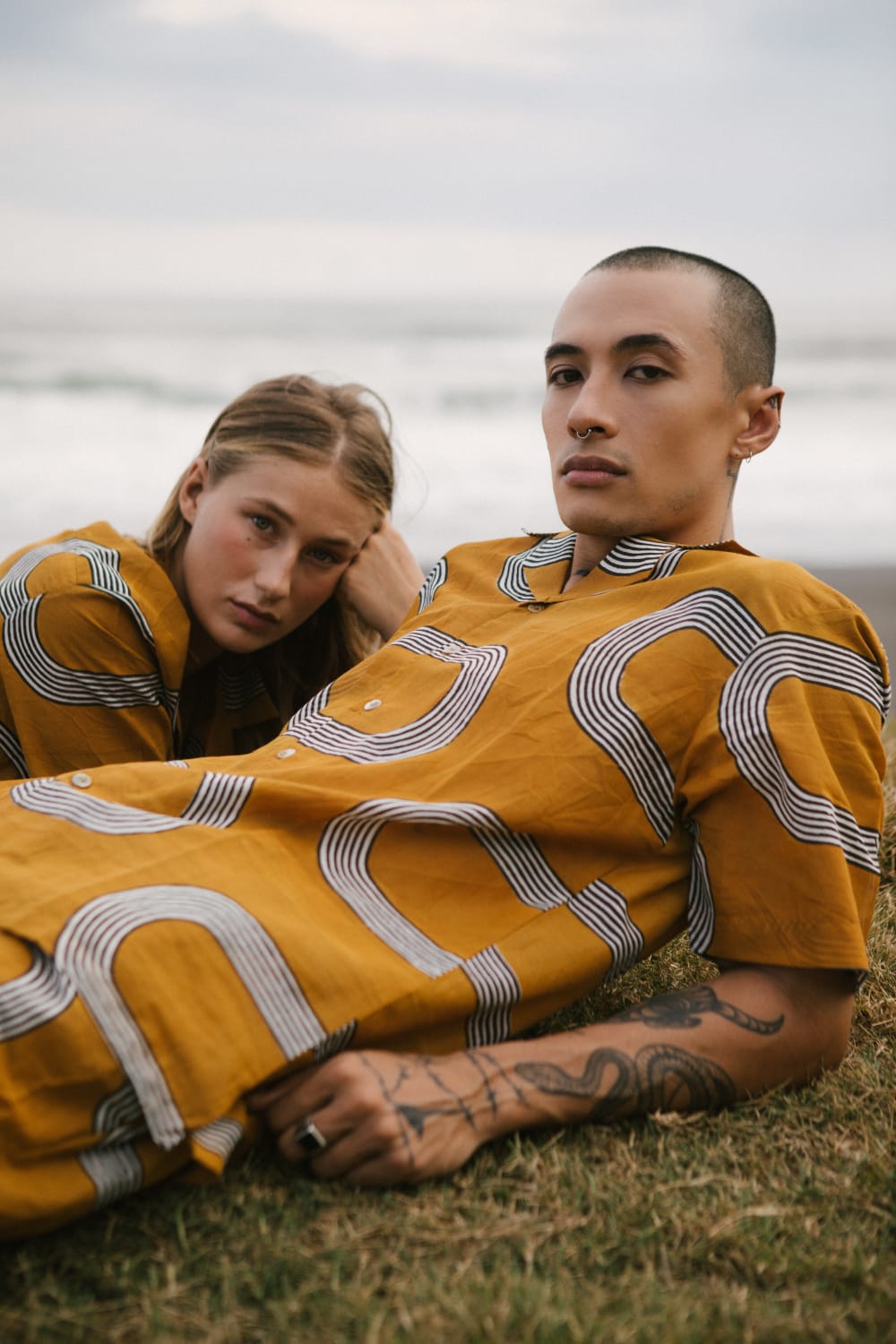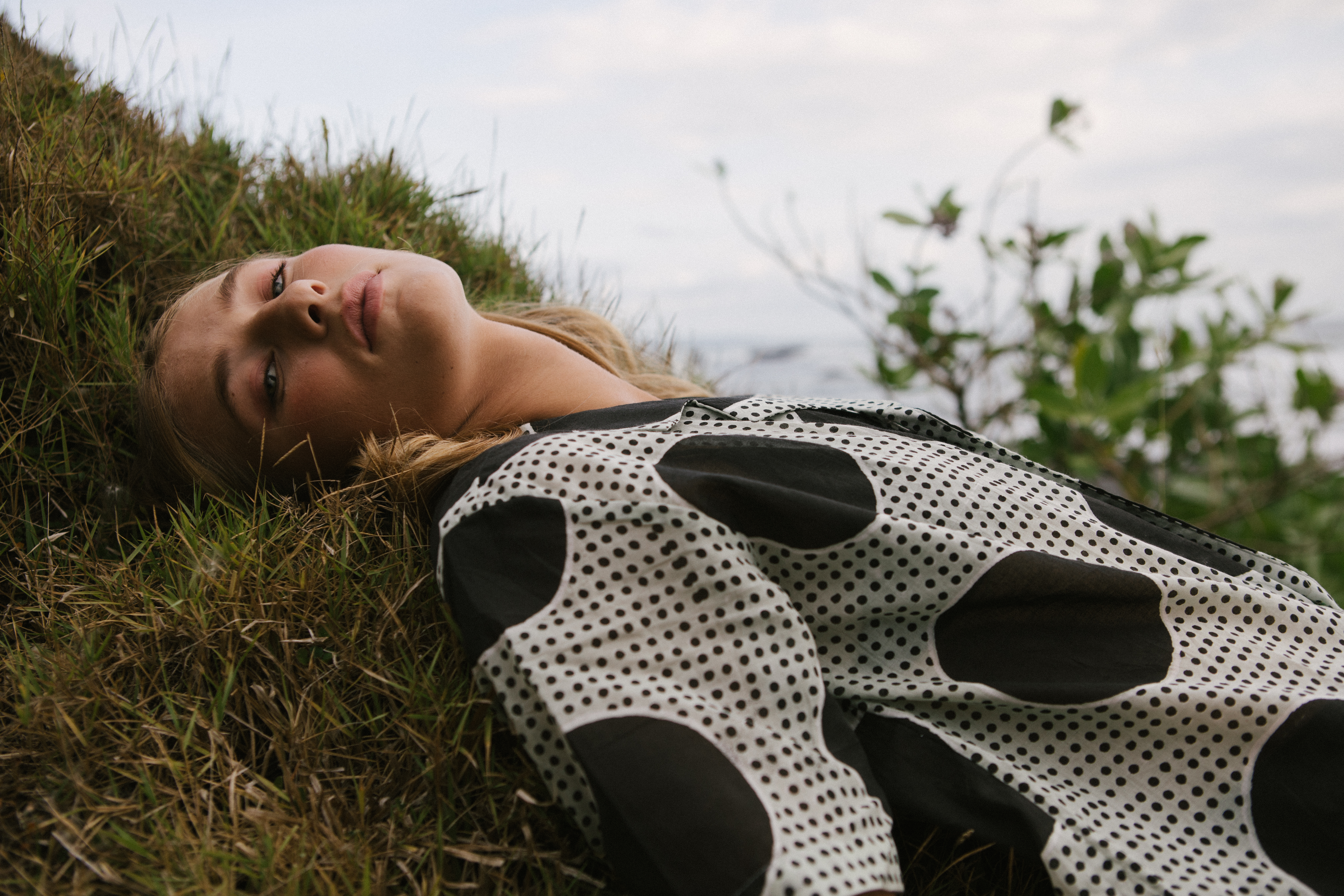London College of Fashion (LCF) graduate Monica Tarunadjaja is one half of eco-conscious ready-to-wear brand Stain. Established in 2018, Monica and co-founder Pooja Bhansali, chose the word stain to represent their brand as “we create products that are long-lasting and remembered”. Through upcycling deadstock material, they use different techniques, both modern and traditional, to “deliberately stain a surface and leave an impression”. Stain’s most recent collection is available exclusively at Wolf & Badger.
We caught up with Monica to find out more.

Why did you decide to study at LCF?
I decided to study at LCF because I wanted to pursue my education in Fashion Design and to ultimately start my own brand one day. After doing a year at Parsons New York, I decided to transfer to LCF as I wanted to learn how to create clothes that are sellable and wearable, not just as a form of art. I chose LCF because I knew that the school focused on teaching all different aspects of fashion including design, technology and business etc. Although I did a design-focused course, I still learnt a lot about the business aspect of design.

What were your experiences of the course, and of studying in London?
The course, BA (Hons) Fashion Design & Technology: Menswear, was very tough. There were long hours, hard days and definitely frustrating moments. Learning pattern-making from zero was very challenging. I have always believed in collaborating with others, which was why for my final project, my best friend and I decided to partner up to create a larger final collection. We also collaborated with a textile designer. I loved London so much and my experience studying there have been the best memories that I have made. I’m definitely looking forward to sharing my work in London one day.

Since graduating you’ve launched the eco-conscious fashion brand, Stain. Can you tell us more about this?
Stain is a ready-to-wear brand with a mission to raise awareness towards sustainable and ethical fashion. Our pieces are created with the intention that people can love and keep them for a long time. The main design element of our brand is that we focus a lot on the process - which begins with our fabrics and material choices. We specialise in creating unique textiles using modern and traditional techniques, whether that is through surface design such as batik or fibre arts such as weaving. We upcycle deadstock natural fabrics and use only sustainable materials. We also focus on empowering local artisans through the #IMadeYourClothes movement by embracing transparency within our business. At Stain, I’m the fashion designer and co-founder, while my partner is a textile designer. We are currently a very small team so my partner and I are very hands-on with all aspects of the business, from working with suppliers to finance and digital marketing etc.

You upcycle a lot of deadstock natural fabrics to create your clothes. Why was upcycling an important part of the brand?
Yes, a component of our material choices are deadstock natural fabrics, because these fabrics are always overlooked, and unfortunately end up in landfills. By using deadstock fabrics to create our clothes, we are giving a new life to something that would otherwise have been discarded. Upcycling is important because it prevents waste from entering landfills, but it also highlights the importance of using the resources that we have available around us. Working with deadstock fabrics has also taught us to be problem-solvers and to find creative solutions within our design and production process. With the fabric offcuts that end up on the cutting room floor, we upcycle them as well to create zero-waste accessories.

How do you source the deadstock? Does this impact the designs?
We source our deadstock fabrics by visiting different warehouses that keep all the leftover materials. We sort through them to find the best quality fabrics they have. We also work with suppliers that send us samples of deadstock fabrics that are available. Working with deadstock fabrics can be challenging because the options are very limited. We are not able to request for what we specifically want, and as the quantities are limited, we might not be able to get the same or similar material choices again, which affects us not be able to restock pieces once the fabric is finished. It also impacts the designs in a way that the materials are all different.

What has the experience of setting up your own brand been like? What lessons have you learnt?
Starting my own brand has been very challenging, there are many ups and downs. On one hand, there’s a lot of artistic freedom, but on the other hand, it’s very stressful as there’s a lot at stake. With the business side, it’s definitely trial and error. I learned by doing and making mistakes along the way. With sustainability, there were many conscious decisions that I have made and learnt in the process that I would otherwise not have outside of this brand, such as considering biodegradable packaging, no-plastic trims and finishing, zero-waste accessories and so on. Having an eco-conscious brand means that we have to take into consideration every little detail that makes us sustainable. My experience at LCF has taught me the importance of good quality finishing, organisation and time management skills, as well as creating designs through a process from inspiration to product.

Congratulations, you’re now stocked online at Wolf & Badger and will be in their store later this month. How does it feel?
Our second drop is available offline at the Wolf & Badger store at Coal Drops Yard and online on their website. The collection features new original prints that we have created using handmade screen-printing techniques in Indonesia and traditional woodblock printing in India.
I actually signed up for Wolf & Badger through their site, fortunately, they accepted us after a rigorous selection process and they’re able to validate our sustainability practices. We are super excited to be stocked at Wolf & Badger as it is our first stockist in the European region. For me personally, it feels like I’ve come full circle as I went to school there and now I have my brand stocked there. It feels amazing to be able to share my vision and designs with people in London.

What is next for Stain?
We hope to be able to reach more people around the world and be able to share with them the beauty of artisanal crafts and textiles. We want to continue to explore various types of textile processes, eventually expanding our product line and also collaborate with more people, businesses and organisations.

Helpful links:
- Tell us what you're up to. Share your updates with us and we’ll do our best to feature your profile across our prospectus, website or newsletter. Register your interest
- Find out more about volunteering opportunities at UAL
- Get in touch with the UAL Alumni Team: alumni@arts.ac.uk

